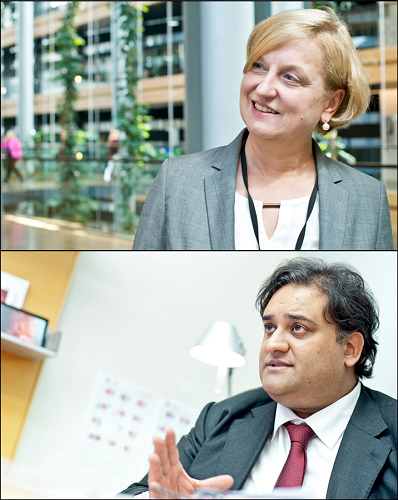Security vs civil liberties: the impact of the Paris terrorist attacks
After the initial shock came the reactions. Just days after the attacks in Paris, governments and politicians started calling for more tools to fight terrorism. How will such measures sit alongside the rights of citizens to privacy or freedom of movement?

Anna Elżbieta Fotyga, chair of the subcommittee on security and defence; and Claude Moraes, chair of the committee on civil liberties, justice and home affairs
Do we now find ourselves in a European "war on terror"? Following the attacks in Paris, some countries have called for a European passenger name record (PNR), tighter border controls and even more internet surveillance to prevent terrorist attacks. We asked MEPs Anna Elżbieta Fotyga and Claude Moraes whether the European Parliament has a role to play in all of this.
Claude Moraes (S&D, UK)
I don’t think it is helpful to talk about wars on terror, I think this is the wrong language. What the European Parliament and the institutions have to do is to understand history and understand that we have managed these very tough situations before. We have dealt with home-grown terrorism in many parts, in Northern Ireland for example, and in Germany and Spain.
We understand the speed with which member states want us to move on - in various issues such as the PNR - but we will take our legislative role very seriously. There has to be a balance between the safety of European citizens, and their privacy and fundamental rights.
Anna Elżbieta Fotyga (ECR, Poland)
I would not call this a war on terror, but we certainly have a problem. We have to be very vigilant. We have to combine our efforts to prevent terrorism, and the radicalisation of various groups which takes place on European territory. I would also like to add that terrorism in Europe is not only the influence of radical Islamism. We also have dangerous situations on our eastern borders, the Russian aggression on Ukraine.
For a very long time the ECR group has been in favour of the adoption of a PNR directive. I know it means closer cooperation of secret services, it means certain dangers in terms of state oversight of secret services. All of us have concern for democracy, but the danger of terrorism is there and we have to prevent the escalation of terrorist attacks. I think the PNR directive should be adopted with many safeguards to guarantee citizens’ rights.
Source: European Parliament
- 285 reads
Human Rights
Ringing FOWPAL’s Peace Bell for the World:Nobel Peace Prize Laureates’ Visions and Actions

Protecting the World’s Cultural Diversity for a Sustainable Future

The Peace Bell Resonates at the 27th Eurasian Economic Summit

Declaration of World Day of the Power of Hope Endorsed by People in 158 Nations

Puppet Show I International Friendship Day 2020

